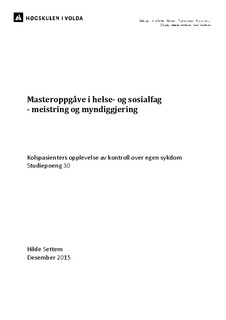Kolspasienters opplevelse av kontroll over egen sykdom
Master thesis
Published version
Permanent lenke
http://hdl.handle.net/11250/2446545Utgivelsesdato
2015Metadata
Vis full innførselSamlinger
- Helse- og sosialfag [55]
Sammendrag
Kols rammer stadig flere. De siste årene har det vært økende fokus på sykdommen både internasjonalt og her hjemme. Det er vist at personer med kols har dårligere livskvalitet enn andre sammenlignbare grupper, samtidig vet vi i dag en hel del om hva som skal til for å lette symptomene ved kols og gjøre hverdagen enklere å leve. Kolssykes egne tanker og erfaringer er sentrale ved livsstilsendringer. Følgende problemstilling ble derfor valgt: Hvilke erfaringer har mennesker med kols knyttet til påvirkning av egen helse?
Forskningsspørsmål:
1. Hvilke personavhengige faktorer påvirker personer med kols sin opplevelse av mestring?
2. Hvilke relasjonelle faktorer påvirker personer med kols sin opplevelse av mestring?
3. Hvilke kontekstavhengige faktorer påvirker personer med kols sin opplevelse av mestring?
Formålet med studien er å få innsikt i hvilke tanker personer med kols har rundt det å kunne påvirke egen helse. Jeg ønsker å se på hvilke faktorer som fremmer og hvilke faktorer som hemmer denne følelsen.
Metode: Kvalitativ studie med intervju av 11 personer med kols grad 1 til 4.
Resultater: Informantene hadde ulike erfaringer rundt å påvirke egen helse. Enkelte av de hadde enda hatt sykdommen såpass kort at de ikke hadde rukket å gjøre seg opp så mange erfaringer, andre hadde en klar formening om at faktorer som røykeslutt, fysisk aktivitet, informasjon og det å ta medisinene riktig kunne gjøre det lettere å leve med sykdommen. Faktorer som fremmet følelsen av mestring var informasjon og kunnskap om sykdommen, fysisk aktivitet, støtte fra andre og mestringstro. Faktorer som kunne virke hemmende var sen diagnostisering, vansker med å slutte å røyke, tungpust, manglende overskudd og andres negative oppfatning av sykdommen. Flere av informantene valgte å holde sykdommen skjult fra omgivelsene. Jeg fikk inntrykk av at dette kunne skyldes skamfølelse over å ha en sykdom som er delvis selvforskyldt. Sykdommen medførte en del begrensninger i dagliglivet til informantene, hvor mye varierte med alvorlighetsgrad. De fleste informantene hadde imidlertid akseptert sykdommen og valgte å ha lite fokus på den i det daglige. De brukte ulike følelsesmessige strategier for å håndtere situasjonen i tillegg til de mer problemfokuserte strategiene som er nevnt over. Abstract
COPD affects increasing numbers. In recent years there has been increasing focus on the disease both internationally and here at home. It has been shown that people with COPD have a poorer quality of life than other comparable groups, while we know today a lot about what it takes to ease the symptoms of COPD and make life easier to live. The thoughts and experiences of those who have the disease are key factors to change lifestyle. The following topic was therefore chosen: What experiences have people with COPD associated with the influence of their own health?
Research questions:
1. Which person dependent factors affect people with COPD and their experience of coping?
2. Which relational factors affect people with COPD and their experience of coping?
3. What contextual factors influence people with COPD and their experience of coping?
The purpose of the study is to gain insight into the thoughts people with COPD have about affecting their own health. I want to look at the factors that promote and factors that inhibit this feeling.
Method: Qualitative study involving interviews with 11 people with COPD grade 1 to 4.
Results: The informants had different experiences around influencing their own health. Some of them had had the disease so short that they had not managed to make up so many experiences, others had a clear idea that factors such as smoking cessation, physical activity, information and taking your medicine in the right way could make it easier to live with the disease. Factors that promoted the feeling of coping were information and knowledge about the disease, physical activity, support from others and self-efficacy. Factors that could hinder was late diagnosis, difficulty with smoking cessation, dyspnoea and others' negative perception of the disease. Several informants chose to keep the disease hidden from the surroundings. I got the impression that this was due to a feeling of shame of having a disease which is partly self-inflicted. The disease led to some limitations in the daily lives of the informants, how much varied with the severity of the disease. Most interviewees, however, had accepted the disease and chose to have little focus on it in their daily life. They used different motionfocused strategies to deal with the situation in addition to the more problemfocused strategies mentioned above.
